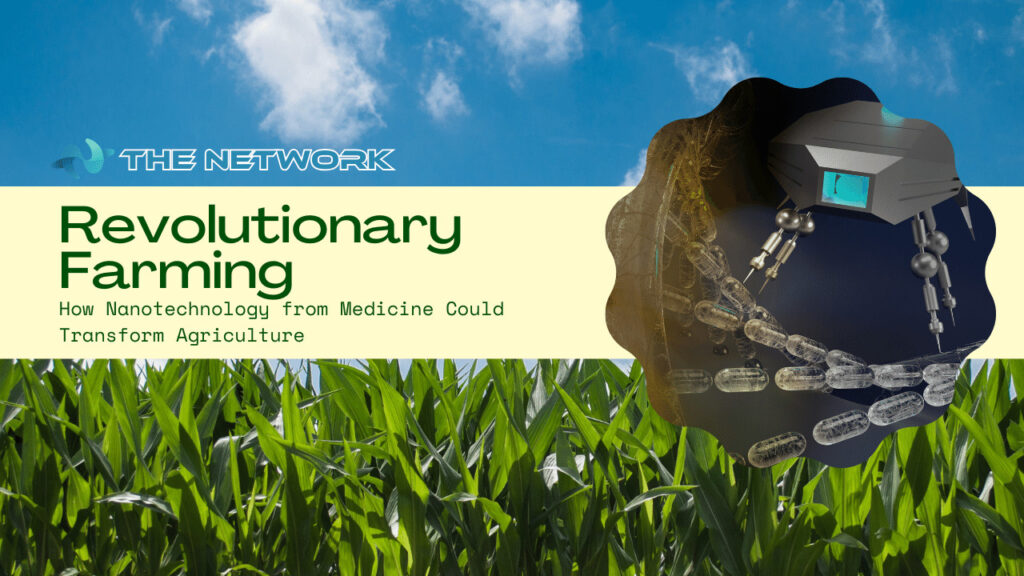Revolutionary Farming: How Nanotechnology from Medicine Could Transform Agriculture

In a world facing ever-increasing food demands, scientists are turning to advanced technologies from medicine to revolutionize agriculture. Nanotechnology, which enables the precise delivery of medicine to specific cells in the body, is now being adapted to target plants. This innovative approach promises to make farming more efficient and environmentally friendly, potentially increasing food production by up to 60% by 2050.
From Medicine to Agriculture: The Argument
Advanced technologies that control the release of medicine to specific cells in the body have shown remarkable success in the medical field. Scientists are now advocating for the application of these same technologies in agriculture. The premise is straightforward: if nanotechnology can precisely deliver drugs to where they are most needed in the body, it should be able to do the same for plants. This method could significantly enhance the efficiency of agrochemical delivery, reduce environmental pollution, and help meet the growing global food demands.
Insights from the Nature Nanotechnology Review
In a review paper published in Nature Nanotechnology, researchers from UC Riverside and Carnegie Mellon University discussed the potential of nanotechnology in agriculture. They highlighted various strategies, such as using nanomaterials coated with sugars or peptides to target specific proteins in plant cells. This targeted delivery can enhance plant resilience against diseases and environmental stresses while minimizing off-target effects.
Reducing Fertilizer Waste with Nanotechnology
Fertilizer inefficiency is a significant issue in agriculture, with up to 50% of applied fertilizer being lost to the environment and contaminating groundwater. Nanotechnology offers a solution by enabling the precise delivery of nutrients directly to the plant roots. This method ensures that plants receive the exact amount of nutrients they need, reducing waste and environmental pollution.
Nanocarrier Molecules: Precision Delivery to Plant Organs
Nanocarrier molecules can be designed to deliver nutrients and other agrochemicals precisely to specific plant organs. This precision delivery system mimics the targeted drug delivery used in medicine, ensuring that the active agents reach the exact locations where they are needed, such as plant vasculature or infection sites. This targeted approach can significantly improve plant health and yield.
Benefits of Nano-Enabled Precision Delivery
- Environmental Protection: Reduced chemical runoff and contamination.
- Enhanced Efficiency: More effective use of agrochemicals.
- Improved Plant Health: Direct delivery to problem areas increases plant resilience.
- Cost-Effective: Less waste translates to lower costs for farmers.
- Sustainability: Supports sustainable farming practices.
Key Points from the Study
- Targeted Delivery: Nanomaterials coated with biological molecules can specifically target plant cells and organelles.
- Disease Resistance: Improved delivery systems can help plants resist diseases and environmental stresses.
- Green Approach: Fewer off-target effects result in a more environmentally friendly farming practice.
- AI and Machine Learning: Digital twins can simulate plant responses to improve nanocarrier design.
- Future Potential: Despite challenges, the future of plant nanobiotechnology looks promising for sustainable food production.
Advantages and Disadvantages
Advantages:
- Increased efficiency in agrochemical use.
- Reduced environmental impact.
- Improved crop yields and resilience.
Disadvantages:
- High initial research and development costs.
- Technical challenges in scaling up the technology.
- Potential unknown long-term environmental effects.
Facts on Nanotechnology in Agriculture
- Precision Delivery: Nanotechnology can deliver nutrients directly to plant roots.
- Reduced Waste: Only 5% of conventional pesticides reach their target; nanotechnology can improve this.
- Environmental Impact: Agriculture accounts for up to 28% of global greenhouse gas emissions; nanotechnology can help reduce this.
- Disease Resistance: Targeted delivery systems can make plants more resilient to diseases.
- AI Integration: Artificial intelligence can aid in designing more effective nanocarrier systems.
The Future of Nano-Enabled Precision Delivery
The future of nanotechnology in agriculture holds great promise. As researchers overcome technical challenges, we can expect to see more widespread adoption of these technologies. This shift will likely lead to more sustainable farming practices, increased food production, and a significant reduction in environmental impact.
School or Homeschool Learning Ideas
- Nanotechnology Basics: Teach students about the basics of nanotechnology and its applications in various fields.
- Environmental Impact: Discuss how nanotechnology can reduce agricultural pollution.
- Practical Experiments: Create simple experiments to demonstrate nutrient delivery in plants.
- AI and Agriculture: Explore the role of artificial intelligence in modern farming.
- Future Farming: Predict and discuss future advancements in agricultural technology.
What Our Children Need to Know
- Environmental Responsibility: Understanding the importance of sustainable farming practices.
- Technological Innovations: How new technologies can solve global challenges.
- Scientific Application: Real-world examples of scientific principles applied to everyday life.
- Career Opportunities: Potential careers in agricultural technology and environmental science.
- Global Impact: The role of technology in addressing global food security issues.
The Big Questions
- How can nanotechnology make farming more sustainable?
- What are the potential environmental impacts of nanotechnology in agriculture?
- How can AI help improve agricultural practices?
- What challenges must be overcome to implement nanotechnology in farming?
- How will advancements in agriculture affect global food security?
Conclusion
Nanotechnology holds the potential to revolutionize agriculture by making it more efficient and sustainable. As we apply medical insights to farming, we can look forward to a future where food production meets the demands of a growing global population while minimizing environmental impact.





Responses